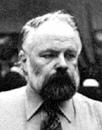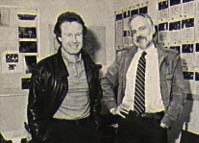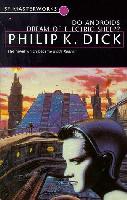Paul M. Sammon Interview
| What is BR? |
| News & Views |
| The FAQ |
| Encyclopedia |
| Quotes |
| People |
| Locations |
| Scripts |
| Analysis |
| Fan-tastic |
| BR Fun |
| BR Game |
| BR Magazine |
| BR Comic |
| Downloads |
| Collectibles |
| Related |
| Links |
| Site Info |
| Search Site |
BRmovie.com is the Home of Blade Runner - the current Blade Runner FAQ, news, resources, links, quotes, scripts and everything else Blade Runner.

![]()
Blade Runner
Buy this Mini Poster at AllPosters.com
|
Any
Comments?
Please e-mail the Webmaster |
| Want the DVD? Or the BR Game? Don't know which books or music to get? Maybe you'd like a Deckard action figure? Make sure you check the BR Related section for all your BR choices. |
|
N: So, for many years, PKD was a heavy drug user. How do you think that affected his work, or was it perhaps even responsible for some of his ideas? PS: Well, it's important to know that during the latter phase of his life, Dick had given up drugs. Yet he still wrote some superior material. So there's that to consider. Again, I think drugs primarily affected his work in the manner I've already described - speed helped Dick write a lot more pages than most people could crank out without amphetamines, but it also fueled his paranoia.
Having said that, I'm equally sure that the preponderance of Phil's themes and imagery sprang from his own life. From his imagination and core personality. Phil was very much the philosopher, you know, and a keen social critic. You don't get those traits from drugs - you get them from your genes. As well as from observation, and education and experience.
PS: I think that moment came from Hampton Fancher and Ridley Scott and David Peoples. Phil literally had no input into Blade Runner's script, other than the fact that it was based on his novel. I mean, Do Androids Dream Of Electric Sheep? certainly doesn't contain passages where giant Geisha Girls pop pills on enormous, neon-encrusted blimps inlaid with massive JumboVision screens... Anyway, I think that that Geisha girl/pill-shot was, on one level, Hampton and David and Ridley's acknowledgement of America's drug culture. It also was sort of a little joke, you know? "Here it is, 40 years after 1982, and people are not only still taking drugs, they're doing it because of blimp advertisements!" Then there's the fact that Ridley had a pretty strong idea about the exact nature of the drug that Geisha was taking. He mentioned it to me after filming, during post (production); it was supposed to be a birth-control pill. Of course, this makes perfect sense in the context of Blade Runner's overpopulated universe. Ridley's notion was that the Los Angeles of 2019 was so densely overcrowded, manufacturers would naturally stress birth-control aids at every possible opportunity. Especially during advertisements. N: It is well known that the film differs in some respects quite significantly from the book, particularly with the exclusion of Mercerism. Of course this is inevitable with any translation of book to film, but Fancher and Scott went further than simply making necessary changes. You have written of how PKD finally accepted that Scott's vision was different to that of the book, but was still valid. Was PKD really happy in the end with how Blade Runner was being made? PS: Everything you've heard about Dick attending a private screening for him to see a special effects and production reel of BR, and then turning around to say, "This is fantastic! How did you guys match up this movie to the book I had in my head?", is absolutely correct. But prior to that screening, which took place in Marina Del Rey at the EEG facility, Phil had been making truculent noises in certain publications about how Blade Runner was dumbing down or mutilating his book. But Phil knew very little about what was really going on with BR at that point. I think Phil also didn't realize that people like Hampton Fancher - who's this tall, good-looking ex-actor Dick had written off as an aging pretty boy - was actually a man of sophistication and substance. A lover of poetry, drama and literature. A guy who'd tried to option Electric Sheep on the value of its thematic concerns, and the quality of its writing.
So there's one response to your multi-part question (laughs). Another, where you mention Mercerism, well, that really gets to the heart of the problem of translating novels into films, doesn't it? I mean, it's precisely because of elements like Mercerism and the chickenheads, and the forecast of virtual reality and influential fringe religions, which has helped make Electric Sheep a distinctive literary work. But - and I don't know how many times this has to be said before the immutable reality of the statement sinks in - films and novels are two different art forms.
What I'm trying to say is that if you loved a book, try to step back for a moment before you condemn its cinematic incarnation. Try to determine whether you're seeing a good movie first, rather than an awkward adaptation of a beloved novel. Because what literature lovers must understand - and I'm one of them, by the way - is that movies are like moving Cliff's Notes. They hit the high points of a novel, simply because of the demands of the medium they're being transferred to. And that's that. So why should anyone be surprised that the work of adapting Electric Sheep into BR went through the same process of compression and deletion that any book-into-movie receives?
|

 Conversely,
I'm sure some of the imagery Dick included in his fiction was drug-induced.
It had to be. I mean, I still smoke pot occasionally, right? And
despite what endless Republican administrations in my country would
have you believe, marijuana actually can occasionally reward
you with unexpected images or story points, ones you might never
have conjured up while you were straight.
Conversely,
I'm sure some of the imagery Dick included in his fiction was drug-induced.
It had to be. I mean, I still smoke pot occasionally, right? And
despite what endless Republican administrations in my country would
have you believe, marijuana actually can occasionally reward
you with unexpected images or story points, ones you might never
have conjured up while you were straight. N:
In Blade Runner there is a huge neon advertising screen,
which at one point shows a young lady popping pills - do you think
this is a reference to the drug culture of the future that PKD was
suggesting would become more prevalent?
N:
In Blade Runner there is a huge neon advertising screen,
which at one point shows a young lady popping pills - do you think
this is a reference to the drug culture of the future that PKD was
suggesting would become more prevalent? I
also think Phil didn't realize Ridley Scott wasn't your typical
assembly-line director, either. Ridley definitely doesn't have to
make features, you know; he's more than financially secure with
all the commercials he's done. And continues to do. But Ridley loves
movies, and he takes his film work seriously. Probably because he
views those films - beyond the obvious industry glorification that's
involved and the staggering financial remuneration that goes with
that - as another, longer-form way of fleshing out the fine art
histories and graphic abilities he carries around in his head. All
of which is a long-winded way of saying that Philip K. Dick got
lucky on his first adaptation; the primary creative people at BR's
helm were artists, not hacks.
I
also think Phil didn't realize Ridley Scott wasn't your typical
assembly-line director, either. Ridley definitely doesn't have to
make features, you know; he's more than financially secure with
all the commercials he's done. And continues to do. But Ridley loves
movies, and he takes his film work seriously. Probably because he
views those films - beyond the obvious industry glorification that's
involved and the staggering financial remuneration that goes with
that - as another, longer-form way of fleshing out the fine art
histories and graphic abilities he carries around in his head. All
of which is a long-winded way of saying that Philip K. Dick got
lucky on his first adaptation; the primary creative people at BR's
helm were artists, not hacks. To
take the simplest example: films rarely seem to measure up, artistically
speaking, against the books they were based upon, right? But think
about the unique demands of the two formats for a moment. A novel
can spend as many pages as it wants delving into the inner lives
of its characters. Yet one page of your typical screenplay translates
into one minute of screen time. And most films still cling to the
two hours or under rule. So even a relatively slim novel like Electric
Sheep, if faithfully adapted, would probably have ran over three
hours, once it was translated into a film.
To
take the simplest example: films rarely seem to measure up, artistically
speaking, against the books they were based upon, right? But think
about the unique demands of the two formats for a moment. A novel
can spend as many pages as it wants delving into the inner lives
of its characters. Yet one page of your typical screenplay translates
into one minute of screen time. And most films still cling to the
two hours or under rule. So even a relatively slim novel like Electric
Sheep, if faithfully adapted, would probably have ran over three
hours, once it was translated into a film.